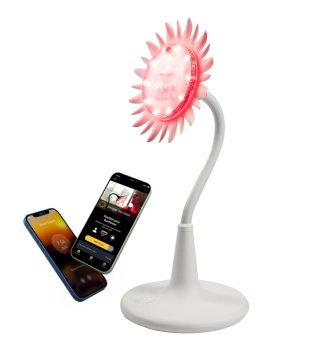
- Shop
- Learn
-
-
- Buy The Sunflower Now
Feel the difference
Get Started with JustLight
Sunflower is the most advanced light therapy available today.

-
- Collaborate
- Blog
- Quiz
- My Account
Free Shipping in the 48 States!
I’ve wanted to be a scientist for as long as I can remember Sure, kid-me didn’t know that was the...
I’ve wanted to be a scientist for as long as I can remember
Sure, kid-me didn’t know that was the name for it. Instead, it was the answer-haver. Or Encyclopedia. A person who could fill my mind with wonder and reason, just as water rushing to fill a temporary vacuum.
I was constantly questing for why things were the way they were, and the people who could answer me were my heroes. I could talk your ear off about every adventure of Miss Frizzle’s class, my favorite Eyewitness book, and all the amazing demonstrations in Bill Nye’s laboratory. Seeing the diverse cast of kids on these shows, asking and answering the same questions I had, left no doubt in my mind that I could do it too.
So I did.
But the path to being a scientist, especially for women, is full of exit ramps and uncertainty.
From the first day of college, talking to classmates gave me a better sense of what the average experience pursuing science was; and how different my childlike vision was from reality. While representation of diverse backgrounds was optimistic in pop culture, there remained institutional and implicit barriers for most budding scientists. My undergraduate chemistry classes were 50/50 split among men and women students. On the other hand, that same chemistry department had just hired their 3rd female faculty member out of 16 faculty total. At U of Michigan, while more than 60% of grad students in my department identified as a minority, we did not have a single black faculty member out of the 55 employed. Further, women faculty across the board were less likely to be “Full Professors”, faculty that receive tenure and the best pay. These patterns are quickly noticed by the bright, upcoming scientists. So not only are students working to overcome underfunded science education programs from high school, it feels like there’s no space for them at the top. This was fuel for some.
Fuel for me.
A flame lit beneath me; determined, I pushed forward. Three traits stoked that fire and kept me going: my curiosity, stubbornness, and a slight but pragmatic disconnect from my surroundings.
One, an undying curiosity. Even hitting the wall of “I don’t know” when asking parents and teachers, I filled in the gaps. I made friends with many librarians and became a master of the Dewey decimal system. Everyone has gaps; and that meant not knowing something was an adventure, rather than a point of shame.
Two, my stubbornness. Adults listen to children’s dreams and put in their own two cents. Something easier, more conventional, or something they want to do. To me it didn’t matter. Instead of a chemistry set, I received a pink sewing machine for Christmas. I pressed on. I knew exactly what I wanted to do and no one would change my mind.
And three, a slight disconnect from my surroundings. I pay close attention, but subtext is often lost on me. This can get me into situations where I’m woefully oblivious that someone is angry at me, or, like your standard RomCom, I have no idea I’m being hit on. While that can be embarrassing, the flip side of that coin is that I never think people are talking about me unless mentioned by name. Chauvinist teacher announces to a physics lab with only 4 women that he thinks some of us are in the wrong room? They’re not talking about me. Ostentatious, loud conversation about how the Math Club sure looks different this year? Fascinating observation, full stop. Words can be heavy stones when you carry them in your heart. You feel seen in the worst way. It’s easy to become uncertain, overwhelmed, and take advice towards a different, more “conventional” path.
But I pressed on. My diligent, oblivious nature let me take big, uncompromising strides towards my goals.
A few of my friends, women from historically underrepresented groups, hustled the hardest, knew what they wanted, and mapped every scholarship and grant that could get them there. They felt they had to be ten times the scientist of anyone else to make it. Others found great research mentors that fostered their skills and helped lift them up.
But most languished; and left science for different careers. For all the societal push for women and minorities in STEM (Science, Technology, Engineering, and Mathematics), it didn’t feel like there was anywhere to go with that degree.
Moving out of academia for industry, I became a STEMinist. I wanted to do what I could to help foster space for women entrepreneurs and highlight others’ successes; to be that light at the end of a long, dark tunnel. Joining JustLight pbc as a founding member empowered me to talk with students from all stages about opportunities as entrepreneurs. I have connected with other STEMinists in Ann Arbor’s robust biotech and start-up community through programs like Michigan Shine & Rise and MichBio. I highlight the work of underrepresented groups. I’m consciously being more vocal and putting myself in the room with larger companies to start difficult conversations about representation.
I am taking up more space because women belong in these positions; and I’m happy to hold a spot for them.